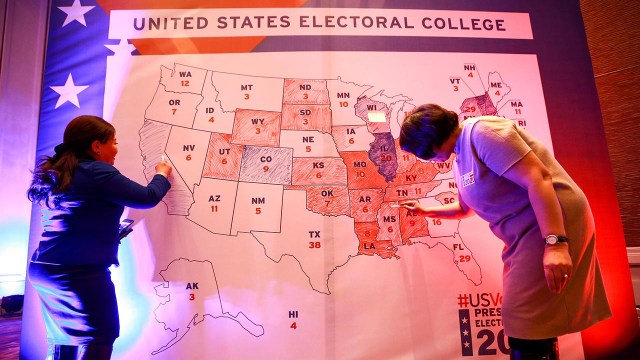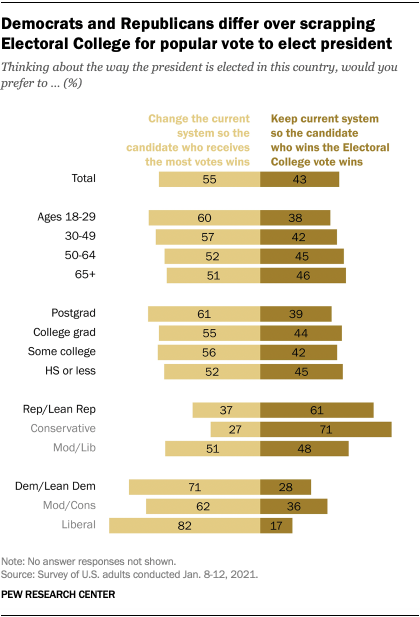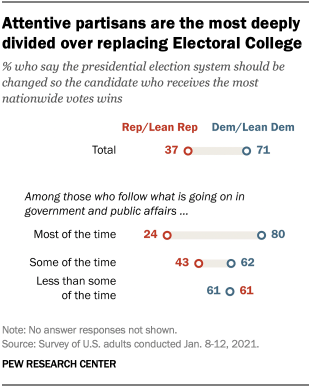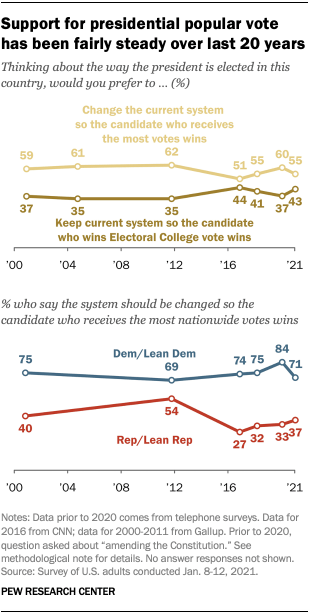How Should The Electoral College Be Changed

The Electoral College has played an outsize role in several elections in recent memory, and a majority of Americans would welcome a change to the mode presidents are elected.
Prior to the 2020 ballot, many observers noted that – if Donald Trump were to win – his most likely path toward victory would involve him winning the Balloter College while losing the popular vote (as was the example in 2016). This did not happen, only the current political geography of the United States continues to allow for the possibility that the winner of the popular vote may not be able to secure plenty Electoral College votes to win the office.
In 2000 and 2016 the winner of the popular vote lost the election after receiving fewer votes in the Electoral College. In social club to continue tracking how the public views our system of deciding presidential elections, we surveyed 5,360 U.Southward. adults in January 2021. Anybody who took office is a fellow member of Pew Research Center's American Trends Panel (ATP), an simply survey panel that is recruited through national, random sampling of residential addresses. This way nearly all U.Southward. adults have a take chances of choice. The survey is weighted to exist representative of the U.S. adult population by gender, race, ethnicity, partisan affiliation, instruction and other categories. Read more well-nigh the ATP'south methodology.
Hither are the questions used for this report, forth with responses, and its methodology.
In January 2020, Pew Inquiry Centre ran a survey experiment in which this question was asked in two slightly different ways. 1 used the language that had been used in 2000 and in subsequent surveys over the years, with the reform option request nigh "alteration the Constitution so the candidate who receives the about votes nationwide wins the ballot." The other modified the pick to "changing the organisation." That survey revealed no noun differences betwixt asking about "changing the system" and "amending the Constitution."
We did this experiment in large part because reform to the way presidents are selected does not technically require amending the Constitution – the National Popular Vote Interstate Compact, for example, could in theory achieve the same ends without the need for a formal subpoena. Since there was no substantive divergence in the survey results betwixt the ii question wordings, nosotros have adopted the revised wording.
Joe Biden won the popular vote by a margin of about 7 million votes and 4.5 pct points overall (51.four% of all votes cast across the country were for Biden, 46.9% for Trump). That ultimately translated into an even greater share of the votes in the Electoral College, but – for the second straight election – the outcome in the Electoral College was determined past a relatively small-scale number of voters in a handful of swing states.

A small majority of Americans continue to favor changing the manner presidents are elected, every bit they did in a January 2020 survey: 55% in the new poll say the system should be changed then that the winner of the popular vote nationwide wins the presidency, while 43% favor keeping the Electoral College arrangement. The current balance of opinion is footling inverse over the concluding few years.
Attitudes nearly the Electoral College remain deeply divided along partisan lines. Democrats and Democratic-leaning independents – especially liberal Democrats – say they would prefer changing the system to be based on the popular vote (71% of Democrats overall, including 82% of liberal Democrats, say this). Republicans and Republican leaners – especially conservative Republicans – prefer keeping the current system where the winner of the Electoral College takes part (61% of Republicans overall, including 71% of conservative Republicans, say this).
Overall, other demographic divides are relatively modest. Younger adults are somewhat more supportive of changing the organization than older adults (60% of those ages 18 to 29 back up changing the organization, compared with 51% of those 65 or older). A similar dissever emerges beyond levels of formal education. Those with postgraduate degrees are somewhat more than supportive of changing the arrangement than those with less formal teaching.

Partisan divides in views of the electoral college are most pronounced among those who pay the most attention to politics. Among partisans who say they follow what is going on in government and public diplomacy "virtually of the time," 80% of Democrats but only 24% of Republicans say they favor changing the system. For those who say they follow politics "merely now and so" or "hardly at all," in that location is no partisan gap in attitudes.
On the whole, attitudes virtually the Electoral Higher are lilliputian changed over the concluding several years, and this reflects a largely stable partisan separate with seven-in-ten or more Democrats and about three-in-x Republicans supporting reform.
After winning both the popular vote and the Electoral Higher in November's presidential election, Democrats' support for reform has slipped somewhat from a high signal at the outset of 2020. Republican support for reform remains low but has increased somewhat since 2016.

Note: Here are the questions used for this report, along with responses, and its methodology.

Bradley Jones is a one-time senior researcher focusing on politics at Pew Enquiry Center.
How Should The Electoral College Be Changed,
Source: https://www.pewresearch.org/fact-tank/2021/01/27/majority-of-americans-continue-to-favor-moving-away-from-electoral-college/
Posted by: shepherdfrocution.blogspot.com


0 Response to "How Should The Electoral College Be Changed"
Post a Comment